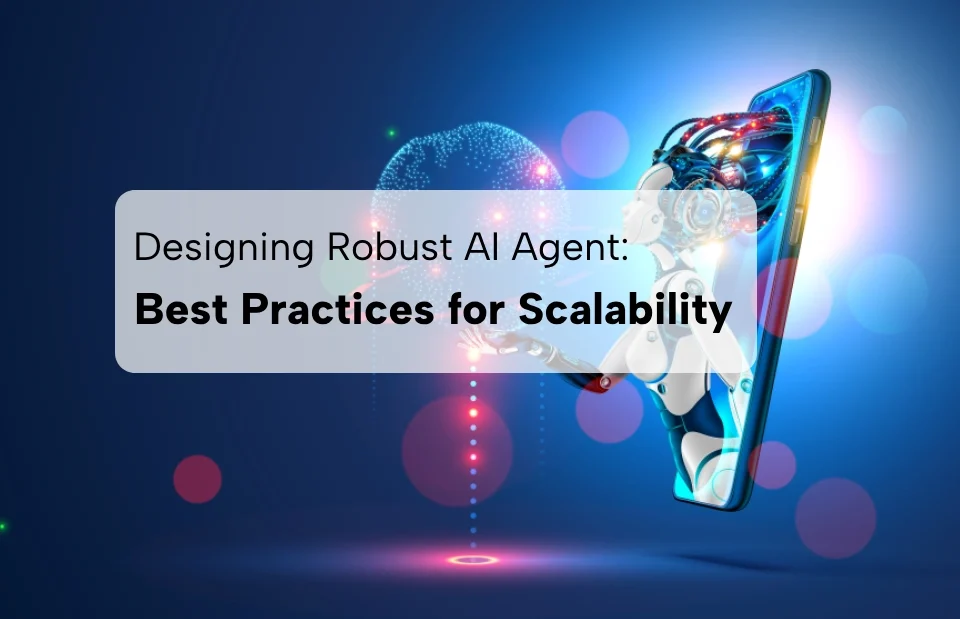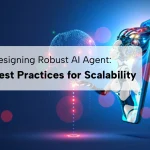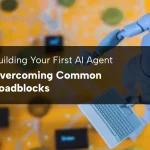Healthcare facilities face unimaginable challenges today, including staff shortages, increasing costs, and the increasing expectations of patients. AI agents in healthcare are becoming powerful tools to tackle the challenges that face healthcare professionals, changing all aspects of diagnosis and administration.
Table Of Contents
- AI Agent Use Cases in Improving Patient Care
- Personalized Care Management
- Remote Monitoring Solutions
- AI Agent Use Cases in Patient Diagnostics
- Medical Imaging Analysis
- Early Disease Detection
- Predictive Patient Flow Management
- Census Prediction and Resource Allocation
- Intelligent Scheduling Optimization
- Implementation Considerations for Healthcare Organizations
- Data Security and Compliance
- Integration with Existing Systems
- Staff Training and Change Management
- Case Study: Metropolitan Health System
- The Future of AI in Healthcare
AI Agent Use Cases in Improving Patient Care
Patient care represents the heart of healthcare delivery, and AI agents in healthcare are transforming how providers interact with and monitor those under their care.
Personalized Care Management
AI agents analyze individual patient data to create truly personalized care experiences. Virtual health assistants monitor medications, check vital signs and make specific health advice in accordance with each patient’s individual profile.
A Boston medical center has recently rolled out AI agents to provide post-discharge care for Cardiac patients.
Their system:
- Monitors patient-reported symptoms through a simple mobile interface
- Adjusts follow-up schedules based on risk indicators
- Sends personalized recovery guidance at optimal intervals
- Alerts care teams when intervention may be necessary
Their readmission rates dropped 32% within the first six months—a remarkable improvement for both patient outcomes and hospital economics.
“The technology doesn’t replace human connection,” explained their Chief Medical Officer. “It actually enables more meaningful interactions by handling routine monitoring and letting our staff focus on patients who truly need human attention.”
Remote Monitoring Solutions
Healthcare agent use cases increasingly include remote monitoring systems that extend clinical oversight beyond facility walls. These intelligent care systems use connected devices to track patients with chronic conditions, alerting providers to concerning changes before they become emergencies.
For elderly patients or those in rural areas, this continuous monitoring creates a safety net that simply wasn’t possible before AI agents in healthcare became mainstream. Patients report feeling more secure knowing that abnormal readings will trigger immediate provider notification.
One rural healthcare network found their remote monitoring program reduced emergency department visits by 41% among their chronic disease population—creating better patient experiences while significantly reducing costs.
AI Agent Use Cases in Patient Diagnostics
Diagnosis represents one of the most promising applications for AI in medicine, with potential to improve accuracy, speed, and accessibility.
Medical Imaging Analysis
Diagnosis automation tools now assist radiologists by pre-screening images to identify potential abnormalities. These AI agents in healthcare can detect subtle patterns that might be missed by even experienced clinicians, particularly when examining:
- Mammograms for early breast cancer indicators
- Chest X-rays for lung nodules
- CT scans for neurological abnormalities
- Retinal scans for diabetic retinopathy
A large hospital system in the Southwest implemented smart diagnostics tools to address their radiology backlog. The AI pre-screened all images, prioritizing those most likely to contain abnormalities for immediate radiologist review.
The results? Urgent findings were detected 28% quicker. Radiologists also reported less fatigue reviewing normal images. They don’t replace radiologists, but they enhance their effectiveness in the initial screening process in identifying areas of issue for expert evaluation.
Early Disease Detection
Predictive agents now analyze combinations of patient data to identify disease risks before traditional symptoms appear. By examining patterns across lab results, vital signs, genetic markers, and even patient-reported information, these systems spot subtle indicators of developing conditions.
One Midwestern health system uses AI agents in healthcare to screen for sepsis—a life-threatening condition where early intervention drastically improves outcomes. Their system:
- Continuously monitors patient data across the hospital
- Identifies subtle pattern changes indicating possible sepsis
- Alerts care teams through their existing notification systems
- Tracks intervention timing and effectiveness
Their average sepsis intervention now begins 6.4 hours earlier than before implementation, significantly improving patient outcomes.
What makes these diagnostic AI agents particularly valuable is their ability to learn from outcomes. As the system observes which predictive factors most accurately identify conditions, it continuously refines its algorithms to improve future accuracy.
Predictive Patient Flow Management
Healthcare operations present unique challenges—unpredictable demand, complex resource requirements, and high costs of inefficiency. AI for hospital administration addresses these challenges through predictive analytics and intelligent workflow management.
Census Prediction and Resource Allocation
Healthcare automation tools now forecast patient volumes with remarkable accuracy, allowing hospitals to staff appropriately and allocate resources efficiently. These predictive agents analyze factors including:
- Historical admission patterns
- Local event calendars
- Weather forecasts
- Current community illness trends
- Recent ED wait times and throughput metrics
A 350-bed hospital in the Pacific Northwest implemented AI agents in healthcare to predict census by department. Their system now forecasts bed needs 72 hours in advance with 89% accuracy, allowing for more efficient staff scheduling and reduced overtime costs.
The hospital’s operations director shared: “Before implementing AI agents, we were constantly reacting to unexpected surges or lulls. Now we can see what’s coming and plan accordingly.”
Intelligent Scheduling Optimization
Virtual health assistants now manage the complex task of appointment scheduling, considering factors beyond simple calendar availability:
- Provider specialization matching to patient needs
- Equipment availability requirements
- Patient transportation limitations
- Historical appointment duration patterns
- Provider preferences and productivity patterns
These systems reduce wait times while maximizing provider productivity—a win for both patients and healthcare organizations.
What’s particularly impressive is how these AI agents in healthcare learn from actual outcomes. When appointments consistently run longer than scheduled for certain conditions, the system adjusts future scheduling parameters automatically.
Implementation Considerations for Healthcare Organizations
While the benefits of healthcare agent use cases are compelling, successful implementation requires careful planning and execution.
Data Security and Compliance
Healthcare organizations must prioritize patient data protection when implementing AI agents in healthcare. Successful deployments require:
- End-to-end encryption for all patient information
- Role-based access controls limiting data exposure
- Comprehensive audit trails tracking all system access
- Regular security assessments and penetration testing
- Clear data retention and deletion policies
AI Workflows specializes in building secure, HIPAA-compliant intelligent care systems that protect sensitive patient information while delivering operational benefits.
Integration with Existing Systems
Healthcare IT environments typically include numerous legacy systems that must work together seamlessly. Effective AI agents in healthcare integrate with:
- Electronic health record (EHR) systems
- Laboratory and imaging information systems
- Pharmacy management platforms
- Billing and revenue cycle systems
- Staff scheduling and resource management tools
The most successful implementations avoid creating additional data silos and instead serve as connective tissue between existing systems.
Staff Training and Change Management
Technology alone doesn’t create transformation—people do. Organizations seeing the greatest ROI from AI agents in healthcare invest in:
- Role-specific training programs for clinical and non-clinical staff
- Clear communication about how AI augments rather than replaces human roles
- Phased implementation allowing for adaptation and feedback
- Regular assessment of user experience and workflow impacts
- Continuous improvement based on frontline staff input
A medium-sized physician practice found that involving staff in selecting and configuring their scheduling AI dramatically improved adoption rates compared to previous technology rollouts.
Case Study: Metropolitan Health System
Metropolitan Health System (MHS), a fictional but representative example, demonstrates how comprehensive AI implementation transforms healthcare delivery.
MHS implemented an integrated suite of AI agents in healthcare across their three-hospital system:
- Diagnostic support tools that reduced average time-to-diagnosis for complex cases by 22%
- Virtual health assistants handling 70% of routine patient questions and follow-up coordination
- Predictive agents forecasting department volumes and staffing needs 48-96 hours in advance
- Administrative AI for billing optimization and claims processing, reducing denial rates by 34%
The result was a healthcare system that operated more efficiently while delivering better patient outcomes. Staff satisfaction improved as administrative burdens decreased, and patient experience scores rose significantly.
“We expected efficiency gains,” noted their CIO, “but the improvement in clinical outcomes was the real surprise. When our providers spent less time on paperwork and more time with patients, quality metrics improved across the board.”
This case illustrates how AI agents in healthcare deliver value beyond simple cost reduction—they fundamentally improve the delivery of care.
The Future of AI in Healthcare
AI agents in Healthcare represents an important paradigm shift in the way medical institutions function. From enhancing diagnostic accuracy, and streamlining the administrative process these tools improve the capabilities of humans rather than replacing them.
Healthcare leaders who are overwhelmed by staffing difficulties and quality improvement mandates or financial pressures, AI offers solutions that address multiple challenges simultaneously.
Organizations that are gaining competitive edge nowadays are those who see AI not just as a way to cut costs, but as an investment strategy that will transform healthcare delivery models.
The future belongs to healthcare organizations that successfully blend the irreplaceable human elements of care with the efficiency, consistency, and analytical power of AI agents in healthcare.
Want to automate diagnostics or scheduling? Talk to our healthcare AI experts.

Dhruv Dholakia has spent over a decade helping enterprises streamline operations through workflow automation and digital transformation. With a strong belief in building purposeful tech, he now focuses on the next frontier—custom AI solutions and Agentic AI. For Dhruv, AI isn’t just a buzzword; it’s a tool to solve real-world problems and create lasting impact. He’s passionate about making AI accessible, responsible, and truly useful for people, teams, and businesses navigating today’s fast-changing world.





